The 2024 U.S. Presidential Election: Public Opinion on the Economy and Immigration Helped Return Trump to the White House, but with No Clear Policy Mandate
-
Sara M. Kirshbaum
Abstract
We use data from three nationally representative surveys conducted by the University of Massachusetts Amherst Poll in the months leading up to the 2024 general election to provide a data-driven foundation for discussion about the factors contributing to the 2024 presidential election results. Although we do not claim to causally identify any one driver of the election outcome, our polls provide insights about public opinion reflecting the context of the election, the potential drivers of voting behavior, and the degree to which the second Trump Administration enjoys a public mandate for policy change. The public started 2024 with low levels of enthusiasm for a potential rematch between Trump and Biden, although the entrance of Kamala Harris into the race elevated interest and, for Democrats, increased enthusiasm. In the weeks before Election Day, the economy and immigration were top-of-mind issues that a majority of respondents thought Trump would handle more effectively. Heading into a second Trump presidency, we find middling support among Americans for some of Trump’s key policy proposals and those of conservative policymakers entering his administration.
1 Introduction
The 2024 election cycle was one fraught with drama and apprehension. From felony convictions (Bustillo and Fung 2024), candidate swaps (Nicholas and Gregorian 2024), assassination attempts (Korecki et al. 2024), and false claims about immigrant consumption of household pets (Catalini, Carr Smyth, and Shipkowski 2024), the American public endured a feverish horse race in the presidential election. Amidst the spectacle, oscillating perceptions of candidates and emotions about the state of our government cast a long shadow across America’s hyperpolarized political landscape (Martherus et al. 2021). In the aftermath of the election, pundits and scholars are seeking to make sense of the election and predict the likely consequences of Trump’s return to political power.
We use data from three nationally representative surveys conducted by the University of Massachusetts Amherst Poll (UMass Poll) in the months leading up to the 2024 election to capture a series of snapshots of public opinion. While a full accounting of “what happened” in the 2024 presidential election demands additional perspective and study, we provide a data-driven foundation for further research. Although we cannot causally identify any one driver of the election outcome, our polls provide valuable insights about the public’s perceptions of and attitudes toward the candidates, the major contributors to voting behavior, and the future of the American political climate.
We find that the public started 2024 with low levels of enthusiasm for a potential rematch between Trump and Biden, although the entrance of Kamala Harris into the race at the top of the Democratic ticket ameliorated this malaise. Leading up to Election Day, the economy and immigration were top-of-mind issues that a majority of respondents thought Trump would do a better job of handling. Heading into the beginning of the second Trump administration, we find middling levels of overall support among the American public for some of Trumps’ key policy proposals.
2 Data
Throughout this article, we rely on three nationally representative online surveys of American adults administered by YouGov: a survey of 1,064 respondents fielded from January 25 to 30, 2024, a survey with a sample of 1,000 respondents fielded from July 29 to August 1, 2024, and a survey with a sample of 1,500 respondents that was fielded from October 11 to 16, 2024.[1] YouGov relies on a volunteer pool of survey respondents, and uses propensity score weights to ensure that each sample is representative of our population of interest (U.S. adults) on a number of politically relevant characteristics. For all results shown here, the weighted samples are used.
While each questionnaire varied in content, respondents were consistently asked about their views on the presidential candidates and policy issues relevant to the campaign, as well as personal factors such as party identification.[2]
3 Election Context
In this section, we provide some context on what the American public was thinking and feeling throughout the election cycle. We focus on two main aspects of public opinion: perceptions of and emotional responses to the candidates, and attitudes toward democracy and the election in general.
3.1 Perceptions of the Candidates
Early in the election cycle, Americans were mostly disenchanted about the prospective rematch between Presidents Trump and Biden. When asked in the January 2024 poll how a rematch of the 2020 presidential election would impact the country, 45 % indicated that such a race would be somewhat or very bad for the United States, with only 29 % indicating that the matchup would be positive for the country. Results are displayed in Figure 1.[3] While Republicans were more enthusiastic about the pairing than Independents or Democrats, for no subgroup did we find a majority of respondents expressing an appetite for a rematch.
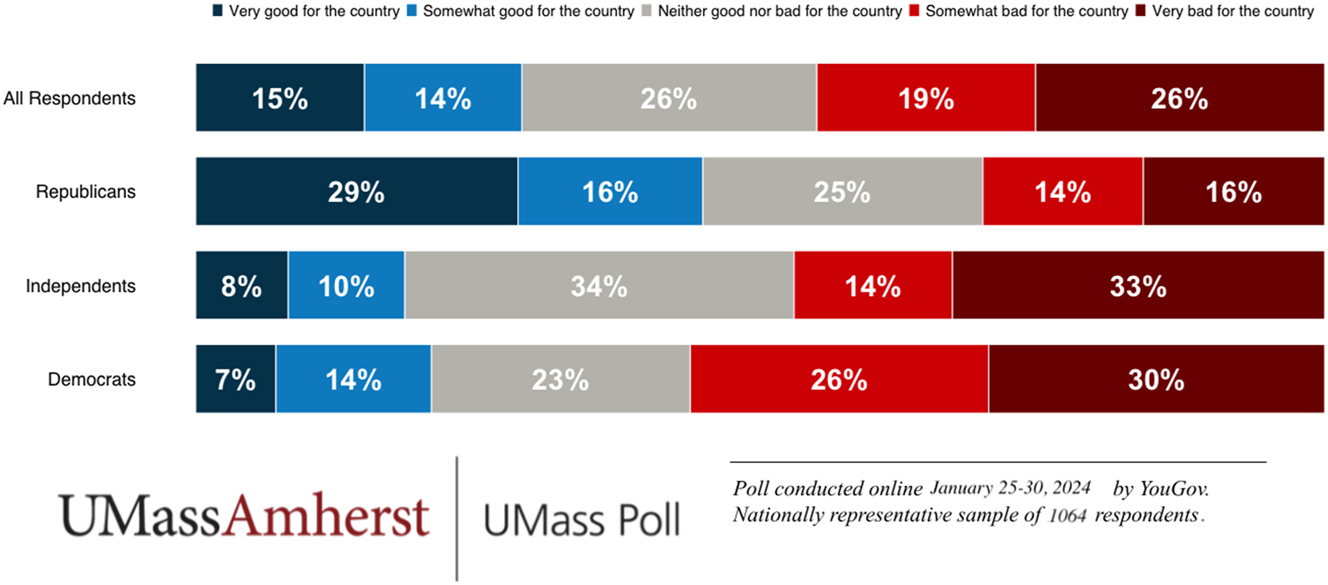
Opinions on 2024 presidential election rematch.
Respondents who indicated that the rematch would be bad for the country were also asked why they held that opinion. A summary of their responses appears in Figure 2.[4] The most popular responses were that the candidates were too old (with 63 % indicating this as a concern) and that Biden and Trump were caught up in the conflicts of the past (48 %). Notably, 36 % of Democrats said the candidates were not addressing the issues that matter most to them, compared to 28 % among Republicans. This was, perhaps, an early warning sign for the Democrats.
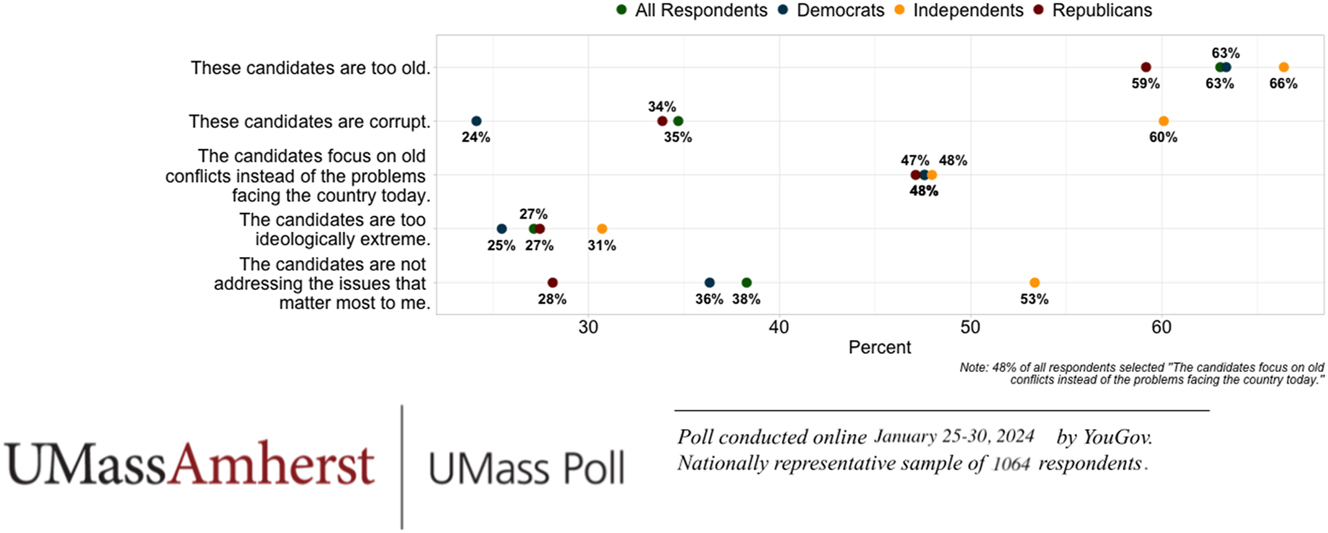
Reasons why a 2020 rematch is bad for the country.
By July of 2024, the campaign had changed dramatically: President Biden stepped aside, and Kamala Haris entered the race as the new Democratic presidential nominee. Our summer survey was fielded just days after this announcement, allowing us to capture the mood of the country at this critical juncture in the race. As shown in Figure 3, in the days after Biden’s announcement, survey respondents strongly supported Biden’s decision to leave the race: indeed, 81 % percent of all respondents reported that they somewhat or strongly agreed with Biden’s move to step aside.[5] This feeling was also felt across party lines, with 82 % of Republicans, 79 % of Independents, and 84 % of Democrats agreeing with the decision. Although Biden loyalists and some pundits questioned whether he should have departed the race so late in the campaign (Blow 2024; Kim et al. 2024), the public embraced his decision.
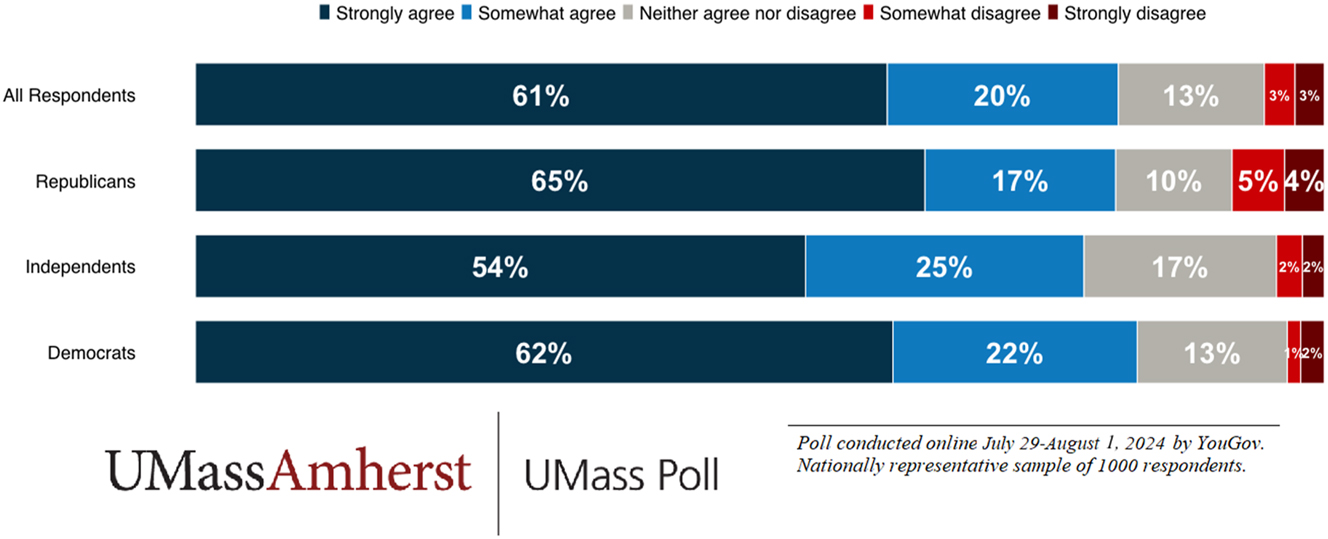
Opinion on if it was the correct decision for Biden to step aside.
The shake-up on the Democratic side dramatically altered respondents’ characterizations of the emotional tenor of the race, in particular by increasing enthusiasm and optimism among Democrats. In each of our surveys, respondents were asked what emotions they think they would feel, both if either the Democrat (Harris or Biden, depending on the timing of the survey) or Trump won the 2024 presidential election.[6] In Figure 4, the top panel shows respondent answers to the question about potential emotional reactions in January, while the middle and bottom panels show responses to the same question for the samples taken over the summer and in October, respectively.[7] Each figure shows which positive emotions (pride, happiness, hope, relief) respondents reported they would feel if the political party they identified with won the presidential election, and negative emotions (sadness, disappointment, anger, fear) they would feel if the opposing party’s candidate won.
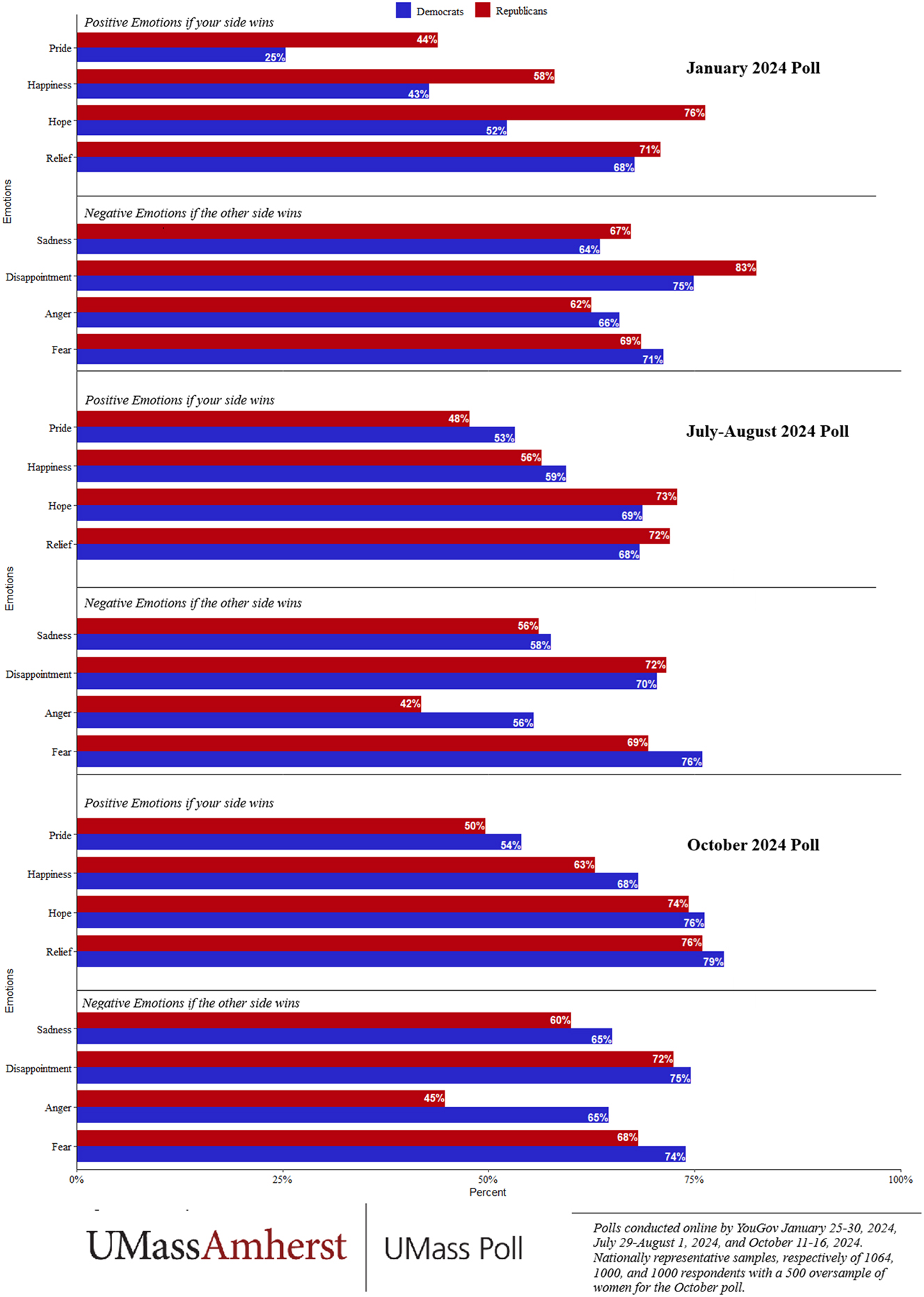
Potential emotional reactions to the election.
In January, Democrats seemed to be suffering from an “emotions gap” compared to Republican respondents. Early in 2024, only 25 % of Democrats reported that they would feel “pride” if Biden won the 2024 election, with only 43 % expecting to feel “happiness.” For Democrats, the most prominent positive emotion reported as of January was “relief,” with 68 % of Democratic respondents expecting they would be relieved if Biden won. Although as of January a minority of Republicans reported they would feel “pride” if Trump won (44 %), Republicans reported much higher levels of expected positive feelings such as happiness (58 %), hope (76 %), and relief (71 %). Republicans and Democrats reported more similar levels of expected negative emotions if their side lost the presidential election. However, the results from January suggest that Democrats were not particularly enthused by the upcoming election or its potential results, even if their preferred party remained in the White House.
When Kamala Harris became the Democratic nominee over the summer, this gap appeared to close. Come July, a majority of Democrats reported that they would feel pride (53 %) and happiness (59 %) if Harris were to win the election in November, a substantial jump from when the same question was asked regarding Biden in January. Notably, in the July poll, Republicans were less likely to report that they expected to feel some negative emotions if Trump lost the election. While 83 % of Republicans reported in January that they would feel “disappointment” if Trump lost to Biden, only 72 % of Republicans reported feeling the same if Trump lost to Harris. Similarly, 67 % of Republicans said they would feel “sadness” and 62 % would feel “anger” if Trump lost a 2020 rematch, while only 56 % and 42 %, respectively, reported they would feel the same emotions if Trump lost to Harris. While any of the many twists and turns that occurred in the election between the beginning and middle of 2024 may have impacted survey respondents’ perceptions of their emotional reactions to the potential election results, Harris’ entry into the race at the top of the Democratic ticket was associated with a notable shift in how both Democrats and Republicans were feeling about the election. These findings also coincide with journalistic accounts from this period, with the newly minted Harris campaign seeing dramatic increases in fundraising (Goldmacher and Haberman 2024; Hartman et al. 2024), and Democrats reporting surges in interest from volunteers (Mascaro et al. 2024).
According to the October poll, our respondents generally retained this outlook going into Election Day. For Democrats, anticipated positive feelings if Harris won were reported at higher levels in some cases. For example, while 59 % of Democrats reported they would feel “happiness” if Harris won in the summer poll, by the October poll, 68 % of Democrats reported they would feel the same. These shifts reflected a longstanding dynamic of voters embracing their partisanship and increasing enthusiasm for their candidate as Election Day approaches (Green et al. 2002).
3.2 Attitudes on Democracy
The health and fate of American democracy were central talking points in the 2024 election. Both Biden and Harris argued consistently that Trump threatened the foundations of the American political system (Axelrod 2024; Memoli and Lebowitz 2024). Trump and his team, in turn, lodged the same attack against Harris and Democratic vice-presidential nominee Tim Walz in the final weeks of the campaign (Lerer 2024).
Anxieties about threats to democracy spilled over into the general population, as shown in Figure 5. In the October poll, fully 81 % of respondents perceived that the election results were extremely or very important for the future of American democracy. Supermajorities of both Democrats (90 %) and Republicans (82 %) agreed that the results were at least “very” important for the future of democracy. The extent to which they voted on this premise is a different matter, something we begin to address later on in this article.
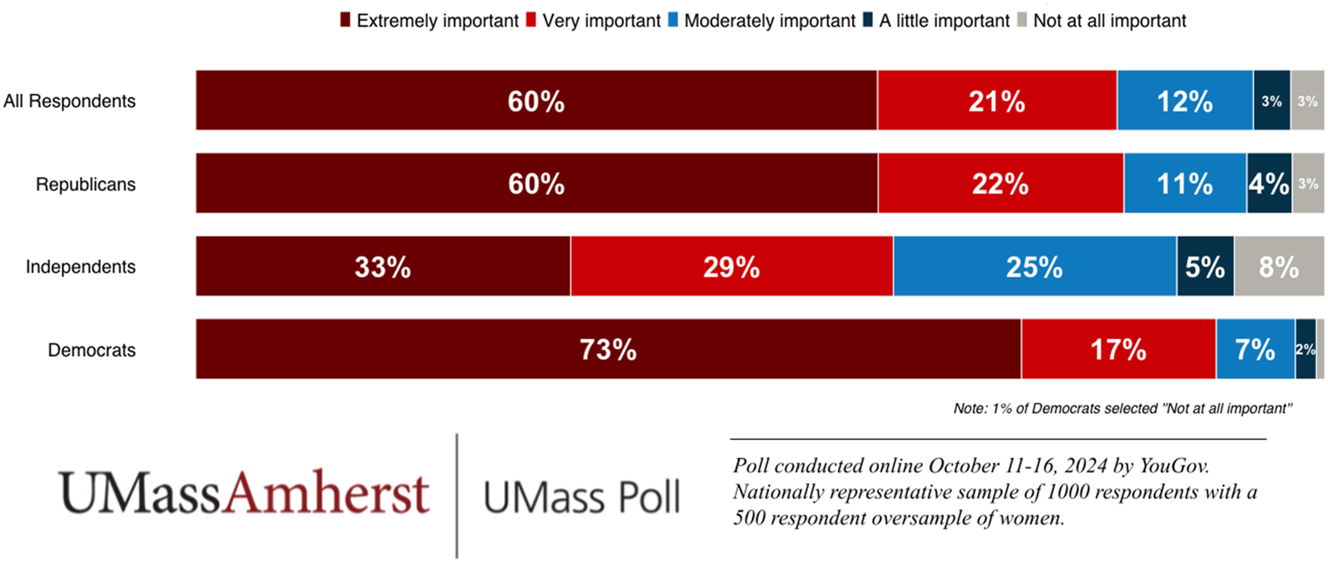
How important are the results of the 2024 presidential election for the future of American democracy?
Our results also indicated that Americans perceived numerous threats to the integrity of the election. In the October poll, respondents were invited to indicate what concerns they had about the upcoming election. Patterns of responses for Democrats, Republicans, and Independents, as well as for the full sample, are presented in Figure 6.[8] For some of these items, the percentage of respondents who perceived a threat varied by party. For example, 72 % of Republicans feared fraud and abuse associated with the counting of ballots, but only 31 % of Democrats shared this concern. Meanwhile, 69 % of Democrats expressed the concern that the losing presidential candidate would refuse to accept the election results, but only 21 % of Republicans did so. Few respondents stated that none of the items presented sparked concern, indicating that most Americans felt uneasy heading into Election Day.
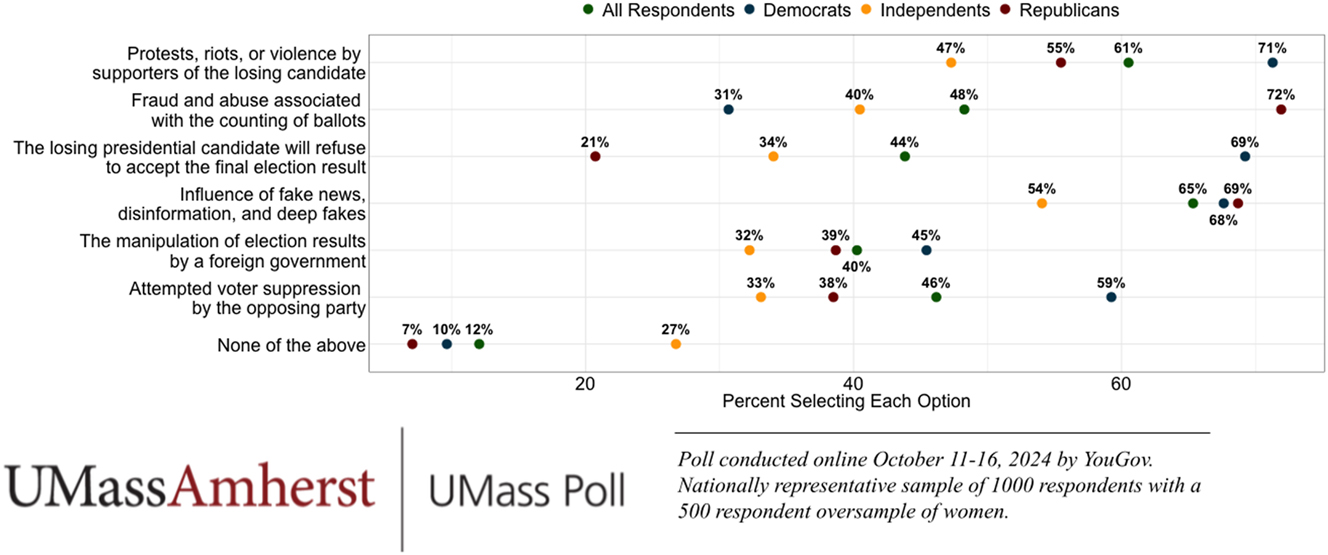
Election concerns.
One of the most troubling aspects of the 2024 election was the salience of political violence in the minds of voters. These concerns and conversations were not unfounded. The transition from the first Trump administration to the Biden administration in 2021 featured unprecedented chaos, culminating in a violent attack on the U.S. Capitol by some Trump supporters intent on blocking Congress’s certification of Biden’s victory (Mascaro et al. 2021). In 2024, two attempts on Donald Trump’s life, including one which left the candidate bloodied, marred the campaign (Colvin et al. 2024; Richer et al. 2024).
Separately from the survey question on election concerns whose results are displayed in Figure 6, respondents were asked specifically how concerned they were about the possibility of violence associated with the 2024 presidential election. A summary of their responses is displayed in Table 1. Here, we see that strong majorities of Americans across the political spectrum expressed fears about election-related violence throughout the year. Concern about election-related violence peaked for the population at large, and Republicans specifically, during the summer poll, which was fielded just weeks after the assassination attempt on Trump that occurred in Pennsylvania on July 13, 2024. There was nothing abstract about the shots fired at Trump during that rally. This was violence in its most concrete form, and appears to have accelerated voter fears at the time.
Reported concern for election related violence.
| January poll | July-August poll | October poll | ||||
|---|---|---|---|---|---|---|
| Very or somewhat concerned | Not very or not at all concerned | Very or somewhat concerned | Not very or not at all concerned | Very or somewhat concerned | Not very or not at all concerned | |
| All respondents | 73 % | 22 % | 77 % | 19 % | 71 % | 23 % |
| Republicans | 65 % | 30 % | 83 % | 15 % | 67 % | 30 % |
| Independents | 61 % | 22 % | 57 % | 35 % | 56 % | 26 % |
| Democrats | 85 % | 15 % | 81 % | 15 % | 83 % | 14 % |
-
Results from three UMass Polls asking respondents: “How concerned are you about the possibility of violence associated with the 2024 presidential election?”
4 Issues Important to Voters
Next, we turn to the policy issues that may have influenced voters’ decision making at the ballot box. Again, we do not claim to provide any one causal explanation for what drove vote choice or the election outcomes. Instead, we outline what issues were top of mind for voters going into Election Day, and how our survey respondents evaluated each of the candidates on those issues.
Table 2 summarizes respondents’ reports of the most important issue for them in deciding who to vote for president in the 2024 general election from our October poll. By a substantial margin, the most-cited issue was the economy. Economic concerns are often top of mind for Americans, regardless of whether they are asked during the acute stage of a national election. The economy was also the top issue for Republicans, and voters who decline to identify with one of the two major political parties. For Democrats, however, the most cited issue was the health of America’s democracy. Although this issue was the second-most-cited concern for survey respondents overall, it was heavily concentrated among Democrats. Inflation, a more specific economic concern, was the main issue for 14 % of survey respondents, including 9 % of Democrats, 20 % of Republicans, and 15 % of Independents. Immigration was the most important issue for 14 % of respondents, although this was mostly concentrated among Republicans (27 %) and Independents (13 %). Additional issues such as reproductive rights were of concern to a substantial proportion of Democrats (14 %), but were much less frequently top of mind for Independents (7 %) and Republicans (2 %).
Most important issue in deciding 2024 vote choice.
| All respondents | Democrats | Independents | Republicans | |
|---|---|---|---|---|
| The Economy | 25 % | 17 % | 29 % | 32 % |
| The Health of our Democracy | 16 % | 30 % | 7 % | 5 % |
| Inflation | 14 % | 9 % | 15 % | 20 % |
| Immigration | 14 % | 3 % | 13 % | 27 % |
| Reproductive Rights | 8 % | 14 % | 7 % | 2 % |
| Health Care | 6 % | 9 % | 6 % | 2 % |
| Crime | 4 % | 4 % | 4 % | 3 % |
| Climate Change | 4 % | 8 % | 4 % | 0 % |
| Taxes | 2 % | 1 % | 5 % | 3 % |
| Supreme Court Appointments | 2 % | 3 % | 2 % | 1 % |
| Housing | 2 % | 1 % | 4 % | 1 % |
| Conflict in the Middle East | 2 % | 2 % | 2 % | 2 % |
| Natural Disaster Relief Efforts | 1 % | 1 % | 1 % | 1 % |
-
Results from UMass poll conducted October 11-16, 2024 asking respondents: “From the list below, please select the issue that will be most important to you when making your candidate decision in the 2024 general election.”
Delving deeper into respondents’ attitudes about the economy – the most important issue for a plurality of respondents – yields additional insight on the election. Respondents’ evaluations of the economy were far from stellar going into Election Day, a dynamic that likely hurt Harris since she was inextricably tied to the Biden Administration. In the October poll, only 5 % of respondents rated the nation’s economy as “excellent.” Instead, a plurality of respondents (36 %) rated the economy as “poor.”[9] Respondents’ evaluation of their own personal economic circumstances did not fare much better. Only 6 % of respondents rated their own economic condition as “excellent,” with 29 % claiming it was “good”, 39 % “fair,” and 26 % “poor.”[10] Respondents’ overwhelmingly sour assessment of the economy likely provided Trump with a significant advantage going into Election Day.
As outlined in Figure 7, survey respondents rated Donald Trump as the candidate who would better handle the issues that were most important to the broadest swaths of voters.[11] Fifty-Four percent of respondents thought Trump would better handle the economy and immigration, as compared to 46 % who thought Harris would be the superior steward of these policy areas. Notably, 54 % is the high-water mark in terms of the percentage of survey respondents who thought Trump would better handle any issue asked about in the survey. Harris received much higher marks on specific issues such as reproductive rights (62 %), climate change (61 %), and health care (58 %). Unfortunately for Harris, however, these issues were simply not at the top of the list of most pressing concerns for a wide range of voters, as shown in Table 2. With just a few weeks before the election, Trump had the advantage of being perceived as better able to address the issues that were most salient to voters.
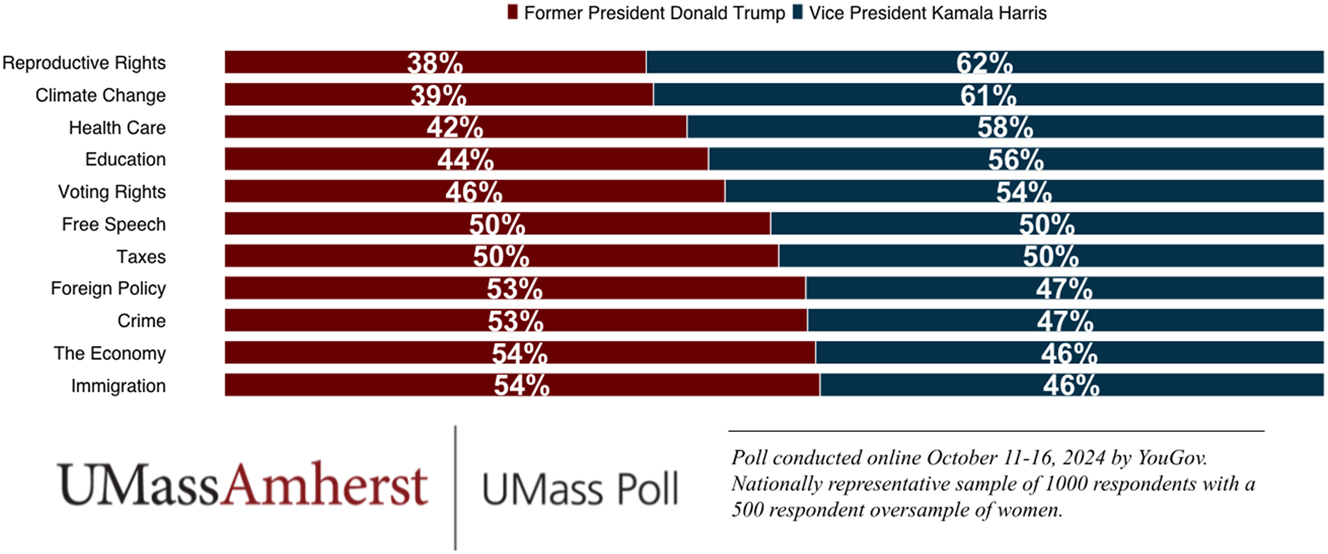
Who respondents think would better handle issues.
Driving this point home further, Figure 8 shows respondents’ most important issue broken down by self-reported vote choice.[12] Trump dominates among voters who indicated they cared most about immigration, taxes, inflation or the economy. Harris enjoyed huge leads among those whose top issues were climate change, the health of our democracy or reproductive rights.
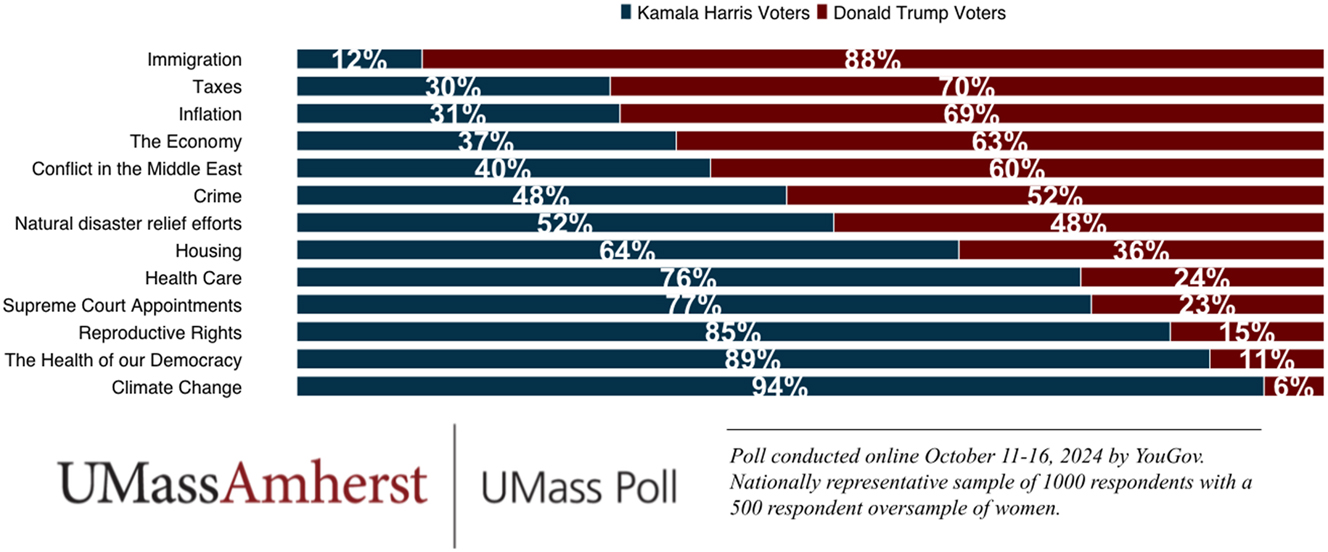
Self-reported vote choice by most important issue.
In addition to immigration being an important issue for many voters, conversations in some circles have tied immigration policy discussions to fundamental worries about the future of America and the integrity of the election itself. Our survey included questions to gauge respondents’ agreement with tenets of a conspiracy theory, elements of which have been creeping into conversations in mainstream politics (Joffe-Block and Yousef 2024; Montanaro 2022). The “Great Replacement Theory” is a conspiracy theory claiming that there is an elite-driven effort to diminish the power and status of white people through unchecked unauthorized immigration and widespread voter fraud by undocumented immigrants (Bauder 2022).
We asked respondents if they agreed with the idea that “there are people who secretly work to make sure immigrants will eventually replace real Americans,” the main tenet of this theory. The results are shown in Figure 9. The plurality of respondents somewhat or strongly disagreed with the statement, however, 27 % of survey respondents held the opposite opinion.
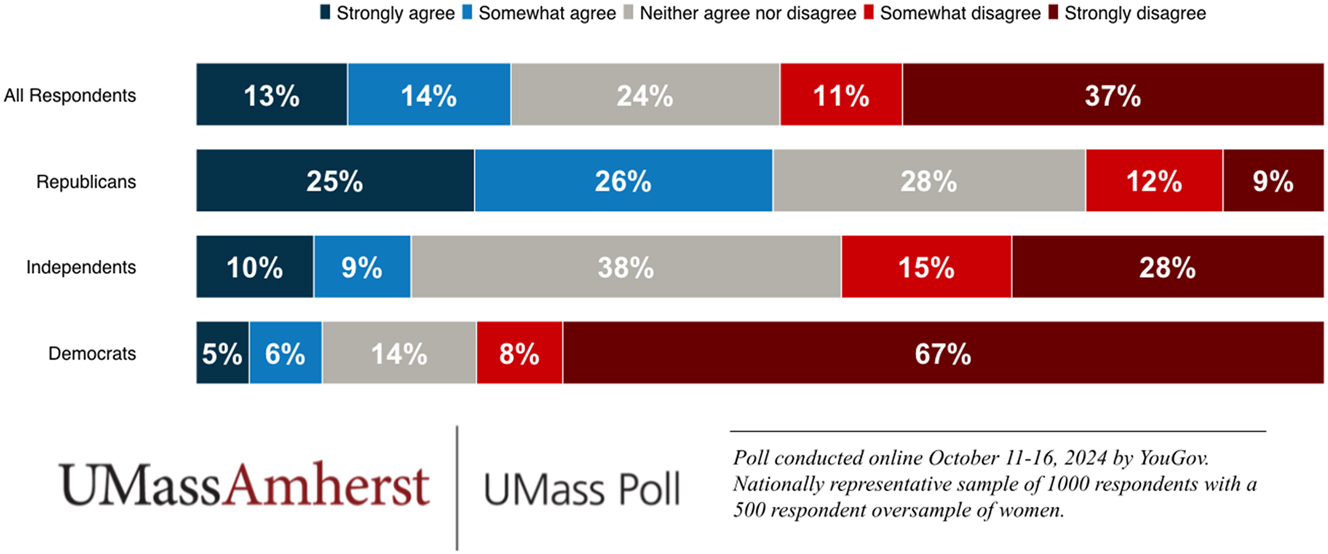
Agreement with statement: “There are people who secretly work to make sure immigrants will eventually replace real Americans.”
A slight majority (51 %) of Republican respondents agreed, during a time when some prominent Republicans embraced these ideas (Bauder 2022; Joffe-Block and Yousef 2024). However, agreement with this statement also found some support among Independents (19 %) and Democrats (11 %). Whether voters truly believed this conspiracy theory or not, Trump’s promise to pursue aggressive policies against undocumented immigrants may have resonated among individuals who appeared to fear immigrants replacing ‘real’ Americans.
Other statements related to this ideology received slightly broader support, especially those tied to how elections function in the United States. Figure 10 outlines how respondents reacted when asked if they agree that “millions of undocumented immigrants illegally cast votes in our elections.” Overall, 29 % of respondents agreed at least somewhat with this statement. Remarkably, a majority (55 %) of Republicans agreed, along with 21 % of Independents and 8 % of Democrats, despite there being no evidence of widespread illegal voting by noncitizens (Brown et al. 2024).
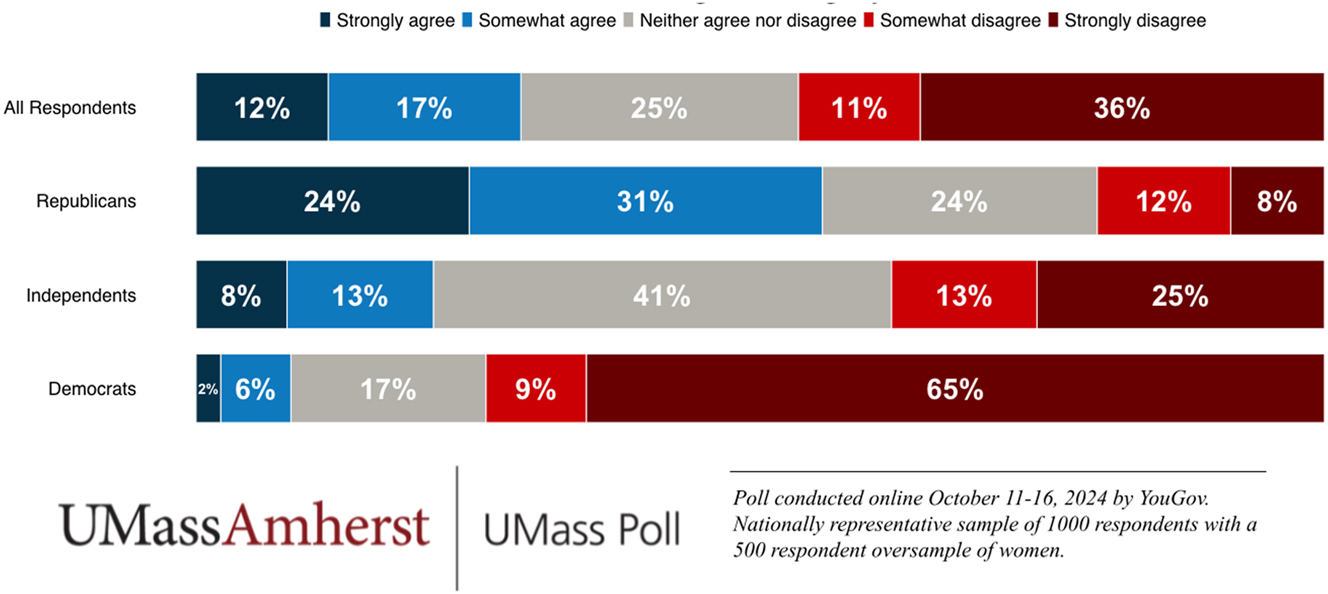
Agreement with statement: “Millions of undocumented immigrants illegally cast votes in our elections”.
When voters say immigration policy is their most important issue, many, our polling suggests, are not simply thinking about the technocratic details of who is allowed to enter the United States, how, and for what length of time. Instead, at least some Americans see this issue as tied to fundamental ideas of what America means and how our democracy does and should function. It is concerning that such substantial proportions of survey respondents agree with the key tenet of a conspiratorial theory, historically rooted in racism, that was once relegated to fringe areas of politics. Although we cannot say definitively with this analysis how much belief in these ideas exactly impacted the election outcome, our results suggest that belief in this ideology and its impact on elections are worthy of further study.[13]
5 A Policy Mandate?
Trump was quick to claim that his victory handed him a decisive mandate from the public going into his second term (Montanaro 2024). However, our polling shows that Americans are deeply divided over many of the proposals floated by Trump and his conservative allies. Using responses from our October survey, we highlight public opinion on policies that fall into four main categories: those associated with, immigration, reproductive rights, family and health policy, and the Heritage Foundations’ Project 2025.
5.1 Immigration
Immigration policy featured centrally in the 2024 presidential race, and played an especially prominent role in Trump’s campaign. Trump has promised an ambitious – if not draconian – initiative to deport millions of undocumented immigrants from the United States, ensuring that immigration policy will remain at the center of American politics during his second term (Grumbach 2024). We asked respondents their opinions on five immigration proposals, and found plurality support for all policies aimed at reducing the amount of immigration. Topline results are presented in Table 3. When it comes to deporting 11 million undocumented immigrants, we find 47 % support in our sample compared to 34 % opposed. Looking at one of Trump’s longtime promises in building a wall along the border with Mexico, we again find 47 % of respondents in support. Forty-nine percent of our sample support using armed U.S. military and National Guard members to enforce immigration law.
Public opinion on selected immigration proposals.
| Strongly or somewhat support | Strongly or somewhat oppose | |
|---|---|---|
| Allowing refugees and asylum seekers the ability to live and work in the United States for a temporary, but extendable, period of time | 50 % | 27 % |
| Deporting 11 million undocumented immigrants out of the country | 47 % | 34 % |
| Building a wall along the border with Mexico | 47 % | 36 % |
| Using armed soldiers with the U.S. Military and National Guard to enforce federal immigration law | 49 % | 32 % |
| Allowing immigrants who are living in the United States illegally to become citizens if they meet citizenship requirements and commit no crimes | 54 % | 28 % |
-
Results from UMass poll conducted October 11–16, 2024 asking respondents: “Recently, there has been a lot of debate about the nation’s immigration policies. Do you support or oppose” each of the policies listed above. Response options included a 5-item Likert scale from strongly oppose to strongly support with a neutral option of neither support nor oppose.
We also find similar levels of support for policies that are less hostile – and indeed welcoming – to immigrants. The only item in our immigration battery that received majority support from respondents (54 %) was allowing undocumented immigrants who meet certain requirements to become citizens. In addition, 50 % of respondents agreed that programs that allow refugees and asylum seekers to live and work in the United States at least temporarily should continue.
These results present seemingly contradictory findings – a country that is both friendly and hostile to immigration at the same time. These divergent results are perhaps not surprising, as immigration policy is complex and has the ability to raise a wide range of conflicting emotions and preferences (Hainmueller and Hopkins 2014, 2015; Nicholson 2012). In addition, the partisan gap in opinions plays a role. While nearly half of our sample supports deporting 11 million undocumented immigrants, fully 82 % of Republicans support this policy, while only 17 % of Democrats do so. Likewise, while 47 % support building a wall along the border with Mexico, only 18 % of Democrats support the policy compared to 84 % of Republicans. Based on these findings, we have little doubt that immigration will remain a highly polarized issue during the Trump Administration.
5.2 Reproductive Rights
With the overturning of the Supreme Court precedent established in Roe v. Wade, the 2024 campaign brought new intensity to the conversation over access to reproductive care in the United States. The Court’s decision returned the question of abortion access to the states, with 10 states taking up the issue specifically in the 2024 election via ballot initiatives (Kaiser Family Foundation 2024). While Trump himself has been inconsistent in his public statements about abortion access throughout his political career (Fernando 2024a), his first-term appointees to the Supreme Court played a key role in dismantling Roe. Furthermore, implementing further restrictions on abortion remains a key issue among important conservative constituencies (Fernando 2024b).
We asked our respondents a series of questions related to abortion access. Notably, 56 % of the sample in the October poll agreed somewhat or strongly that there should be an amendment added to the U.S. Constitution that protects the right to an abortion, which would effectively nullify the decision made by the Supreme Court in Dobbs (Table 4). However, a large partisan gap exists on the issue. Support for a constitutional amendment to protect abortion is very strong among Democrats (87 %), while only 25 % of Republicans support such an effort.
Public opinion on selected reproductive rights policies.
| Strongly or somewhat support | Strongly or somewhat oppose | |
|---|---|---|
| A federal constitutional amendment that protects a woman’s right to choose to have an abortion | 56 % | 27 % |
| A national abortion ban | 15 % | 66 % |
| A federal law protecting access to abortion pills | 55 % | 24 % |
| A federal law requiring emergency rooms to provide an abortion to save the life or health of a pregnant woman | 74 % | 10 % |
| A federal law protecting providers and pharmacists from out of state legal actions and professional licensure consequences for providing reproductive health care services | 57 % | 15 % |
-
Results from UMass poll conducted October 11–16, 2024 asking respondents to simply: “Please indicate whether you support or oppose” each of the policies listed above. Response options included a 5-item Likert scale from strongly oppose to strongly support with a neutral option of neither support nor oppose.
On the flip side of a majority of respondents supporting a constitutional amendment to protect abortion access, we find only 15 % of respondents favor a national ban on abortion. Although there is again a partisan gap in opinion on this issue, with 28 % of Republicans supporting a national ban compared to only 7 % of Democrats, we find no evidence for broad support for banning abortion nationwide. In general, we find majority support for laws that protect abortion access and the medical professionals who provide reproductive health care services.
While partisan gaps in support for various policies associated with reproductive care do exist, based on our polling, it is difficult to claim that the new administration has a national mandate on implementing further restrictions to reproductive healthcare in the United States.
5.3 Family Policy
We asked our sample to respond to a battery of policy questions dealing with families, many of which were discussed at some point throughout the campaign. To start, we asked about support for ending no-fault divorce. Although no-fault divorce was not a key tenet of Trump’s campaign for president, comments previously made by Vice President J.D. Vance raised concerns for some that ending the policy would become, at the very least, a more mainstream topic in policy discussions (Bellware and Timsit 2024; Kruesi 2024). We find only 22 % of our sample supports this, while 36 % oppose.[14] Support is low across all demographics, with Republicans having the highest levels of support at only 30 %.
Where we do find broad support on family policy issues are on attitudes toward paid maternal and paternal leave, paid family leave, increasing the child tax credit, and capping childcare costs. Starting with maternity leave, we find 78 % of our sample supports requiring employers to provide paid leave to mothers following the birth or adoption of a child. There is even broad bipartisan support, with 91 % of Democrats and 70 % of Republicans indicating support. Paternity leave has less support, but still a majority of 66 % supports paid leave for fathers. There is less bipartisan support for this policy, with 87 % of Democrats and 49 % of Republicans in support. Next, we find 76 % of our sample supports requiring employers to provide paid leave to employees caring for a family member with a serious medical condition. Opposition is low at 8 %. Thinking about the child tax credit, 60 % of our sample supports increasing from $2,000 to $5,000. This includes 77 % of Democrats and 51 % of Republicans. Finally, we find that 51 % of our sample supports the federal government ensuring that families with children spend no more than seven percent of their total income on childcare. We also find a larger, 28-point gap in support between Democrats (67 %) and Republicans (39 %). Across the board, then, we see strong support for increasing social spending to support families. On the whole, the Republican Party has traditionally been against extending these benefits, though during the campaign Vance expressed openness to more spending in this area, most notably with the child tax credit (Gold and Sequeira 2024; Picchi 2024).
Finally, we ask about policies related to families and health insurance. Results appear in Table 5. Many of these policies were those that were first implemented by the Affordable Care Act in 2010, a law that Trump unsuccessfully dedicated extensive political capital to overturning during his first term (Pear, Thomas, and Maggie 2017). First, we ask whether private health insurance companies should be prohibited from denying coverage because of a pre-existing medical condition. We find 70 % of our sample supports this policy while 15 % oppose it. This includes majorities of Democrats (82 %) and Republicans (65 %). Considering the role of family health insurance plans, we find that 67 % of our sample supports allowing young adults to stay on their parents’ health insurance plans until age 26. We find majority support among Democrats (81 %) and Republicans (56 %).
Public opinion on family and health policy.
| Strongly or somewhat support | Strongly or somewhat oppose | |
|---|---|---|
| Ending no-fault divorces | 22 % | 36 % |
| Banning in vitro fertilization (IVF) | 10 % | 66 % |
| Requiring employers to provide paid leave to mothers following the birth or adoption of a child | 78 % | 8 % |
| Requiring employers to provide paid leave to fathers following the birth or adoption of a child | 66 % | 14 % |
| Requiring employers to provide paid leave to employees caring for a family member with a serious medical condition | 76 % | 8 % |
| Increasing the child tax credit from $2,000 per child to $5,000 per child | 60 % | 16 % |
| Giving parents an additional vote per child to cast in elections | 10 % | 69 % |
| Prohibiting private health insurance companies from denying coverage because of a pre-existing medical condition | 70 % | 15 % |
| Prohibiting health insurance companies from denying coverage to pregnant women | 71 % | 14 % |
| Allowing young adults to stay on their parents’ health insurance plans until age 26 | 67 % | 14 % |
| The federal government ensuring that families with children spend no more than seven percent of a family’s total income on childcare | 51 % | 16 % |
5.4 Project 2025
Throughout the campaign, one suite of policy proposals that was often discussed by commentators on both sides of the aisle was Project 2025, the Heritage Foundations’ playbook for an incoming Republican president. The document lays out ideas that would make sweeping changes across to the size, scope, and role of the federal government, and that would have impacts on policy issues from health care to immigration.[15] Although the Trump campaign repeatedly attempted to distance themselves from the effort (Levien 2024), others have pointed out the numerous links between the authors of Project 2025, the previous Trump administration, and some of Trump’s own policies (Kelly 2024; Shao and Wu 2024). As the Trump administration begins its term, and fellow Republicans take control of both the House and Senate, it is important to understand where Americans stood on these issues at the time of the election.
In the weeks leading up to Election Day, survey respondents overwhelmingly were aware of Project 2025. When asked how much they have read, seen, or heard about the initiative, only 18 % of all survey respondents claimed they had not heard of it. This held true for 20 % of Republicans, 29 % of Independents, and 12 % of Democrats. Project 2025 was also very unpopular. When asked to rate it on a 0 to 100 feeling thermometer, the average respondent gave it a score of 25. This compares with an average score of 42 for both Elon Musk and Taylor Swift, two polarizing public figures, and even 45 for the much-contested Electoral College. Americans also expressed disapproval of prominent Project 2025 proposals, as shown in Table 6.
Public opinion on selected project 2025 proposals.
| Strongly or somewhat support | Strongly or somewhat oppose | |
|---|---|---|
| Reducing federal civil rights protections for lesbian, gay, and transgender people | 26 % | 47 % |
| Ending federal policies to promote diversity, equity, and inclusion in education, employment, and housing | 36 % | 43 % |
| Shutting down social media companies and internet sites that depict, or contain links to depictions of, pornography | 44 % | 31 % |
| Firing thousands of federal employees and replacing them with political appointees loyal to the president | 10 % | 69 % |
| Restricting women’s access to contraception | 8 % | 74 % |
| Eliminating the Department of Education | 22 % | 62 % |
| Cutting funding for renewable energy research and investment | 22 % | 53 % |
-
Results from UMass poll conducted October 11–16, 2024 asking respondents simply: “Do you support or oppose,” each of the policies listed above. Response options included a 5-item Likert scale from strongly oppose to strongly support with a neutral option of neither support nor oppose.
The policy with the least support is restricting women’s access to contraception. Only 8 % of our sample supports this policy, while 74 % oppose. The next most unpopular policy – firing federal employees and replacing them with loyal political appointments – only enjoys 10 % support while 69 % oppose. Eliminating the Department of Education only has 22 % support, as does cutting funding for renewable energy research and investment. While 26 % of respondents support reducing civil rights protections for lesbian, gay, and transgender people, fully 47 % oppose doing this. Compared with these previous policies, efforts to end federal policies promoting DEI in education, employment, and housing enjoys more support at 36 %, with 43 % opposed. Finally, the most popular of our items on Project 2025 is shutting down websites that contain pornography – 44 % of our sample supports this policy, and only 31 % oppose it. Overall, the majority of the policies we surveyed are unpopular among the American public, some deeply so, such as restricting access to contraception. It is far from clear whether Trump will pursue every policy proposed by the Heritage Foundation. Indeed, our findings suggest he should continue to hold many of them at arm’s length. Nonetheless, Heritage has staked out a conservative agenda, which they will attempt to lobby within the Republican Party, compelling Trump to manage this faction in competition with others.
6 Conclusions
There is still much to learn about and from the results of the 2024 presidential election. In this article, we have established some foundations for future research in three key areas.
First, the context in which the campaign took place included malaise about the candidate choices (albeit more so before Biden dropped out of the race than after) and concerns about the integrity of the election and politically motivated violence. Republican respondents were especially concerned about illegal voting, including by immigrants, while Democrats were particularly anxious about voter suppression and efforts to overturn the election by the losing candidate and their supporters. Future research should examine whether and how partisans’ distinctive concerns about elections influence their perceptions of American democracy and enthusiasm to participate in the political process.
When it came to the specific candidates, Trump was a known entity having already served one term as president, while Harris had spent less time in the national spotlight at the time of her ascendency to the top of the Democratic ticket. Harris’ nomination was also an historic one, being the first woman of color to lead a ticket for one of the two major political parties in the United States. She experienced a burst of enthusiasm among ardent Democrats soon after she entered the race, even if it was not enough to give her victory. Our findings about what voters were concerned about suggests why.
Our second set of analyses indicates that when deciding for whom to cast their ballots, voters considered a standard set of policy concerns including the economy and immigration. If relying simply on correlations, it may not seem surprising that voters chose the candidate they thought, on average, would do a better job at handling the issues that were most important to them. Trump had a clear advantage on top-of-mind issues. Moreover, voters seemed less concerned about issues where Democrats have a stronger brand, such as reproductive rights, healthcare and the environment. However, future research should again evaluate the degree to which policy matters impacted voter decision making as compared to other considerations, such as anti-incumbent sentiment which has been widespread in other democracies (Rising et al. 2024).
Finally, our October poll indicates that while the public sent a Republican trifecta to Washington, this may not indicate a mandate for any specific set of conservative policies. Even as Trump himself enjoyed on average higher approval ratings going into his second term than he did in his first (Jones 2024), our survey respondents reported mixed opinions on immigration policy, and generally supported liberalization on issues such as paid maternity leave and reproductive healthcare access. As ever, lawmakers may have trouble finding a way to legislate on issues that matter deeply to voters, but for which there is no broad consensus on a way forward.
Agreement with statements associated with “Great Replacement Theory”.
| Strongly agree | Somewhat agree | Neither agree nor disagree | Somewhat disagree | Strongly disagree | |
|---|---|---|---|---|---|
| Some elected officials want to increase immigration in order to bring in obedient voters who will vote for them | 25 % | 17 % | 20 % | 9 % | 29 % |
| There are people who secretly work to make sure immigrants will eventually replace real Americans | 13 % | 14 % | 24 % | 11 % | 37 % |
| Millions of undocumented immigrants illegally cast votes in our elections | 12 % | 17 % | 25 % | 11 % | 36 % |
| Immigrants are poisoning the blood of our country | 10 % | 10 % | 21 % | 12 % | 47 % |
| Our people need to have more children. | 9 % | 14 % | 36 % | 15 % | 25 % |
| Many immigrants are terrorists | 7 % | 16 % | 22 % | 13 % | 42 % |
| Immigrants want to rape, pillage, thieve, plunder, and kill the people of the United States | 7 % | 13 % | 23 % | 12 % | 45 % |
| Immigrants are eating dogs and cats | 6 % | 11 % | 27 % | 9 % | 47 % |
| Immigrants commit horrendous crimes because it is in their genes to do so | 5 % | 6 % | 22 % | 13 % | 53 % |
| Immigrants are like animals, not humans | 2 % | 5 % | 18 % | 10 % | 64 % |
-
Results from UMass poll conducted October 11–16, 2024 asking respondents: “Please indicate the degree to which you agree or disagree with each statement.” Response options included a 5-item Likert scale from strongly agree to strongly disagree with a neutral option of neither agree nor disagree.
Table A1 gives topline results for how respondents answered all questions asked in the October poll related to Great Replacement Theory. As outlined in Figure A1, respondents were asked if they agree that “some elected officials want to increase immigration in order to bring in obedient voters who will vote for them.” This is a similar sentiment to the statement evaluated in Figure 8 in the main text, though here, we are asking respondents to specifically consider their belief in this idea as it relates to potential election outcomes. This statement received the strongest level of support from the general public among the statements evaluated here, with 42 % of respondents agreeing at least somewhat with the statement. This included 73 % of Republicans, 39 % of Independents, and 15 % of Democrats.
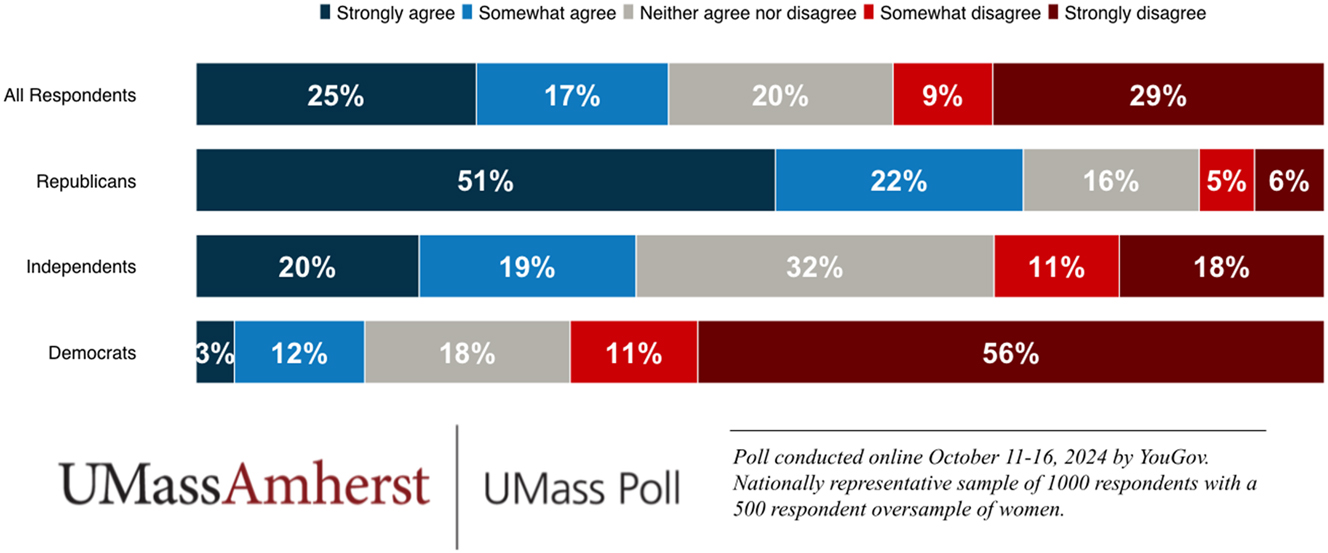
Agreement with statement: “Some elected officials want to increase immigration in order to bring in obedient voters who will vote for them”.
References
Axelrod, Tal. 2024. “Harris revives message around democracy as Trump escalates rhetoric. Will it work?” ABC News. https://abcnews.go.com/Politics/harris-revives-message-democracy-trump-escalates-rhetoric-work/story?id=114908724.Suche in Google Scholar
Bauder, David. 2022. “What is ‘great replacement theory’ and how does it fuel racist violence?” Associated Press. https://www.pbs.org/newshour/politics/what-is-great-replacement-theory-and-how-does-it-fuel-racist-violence.Suche in Google Scholar
Bellware, Kim and Annabelle Timsit. 2024. “Women fear Republicans will move to overturn no-fault divorce laws.” The Washington Post. https://www.washingtonpost.com/nation/2024/11/09/no-fault-divorce-jd-vance-conservatives/.Suche in Google Scholar
Blow, Charles M. 2024. “The Strongest Case for Biden Is His Resilience in the Face of Onslaught.” The New York Times. https://www.nytimes.com/2024/07/11/opinion/biden-stay-in-race.html.Suche in Google Scholar
Brown, Theresa Cardinal, Theo Menon, Feyisayo Oyolola. 2024. “Four Things to Know about noncitizen Voting.” Bipartisan Policy Center. https://bipartisanpolicy.org/blog/four-things-to-know-about-noncitizen-voting/.Suche in Google Scholar
Bustillo, Ximena, and Hillary Fung. 2024. “Trump is found guilty on 34 felony counts. Read the counts here.” NPR. https://www.npr.org/2024/05/30/g-s1-1848/trump-hush-money-trial-34-counts.Suche in Google Scholar
Catalini, Mike, Julie Carr Smyth, and Bruce Shipkowski. 2024. “Trump falsely accuses immigrants in Ohio of abducting and eating pets.” The Associated Press. https://apnews.com/article/haitian-immigrants-vance-trump-ohio-6e4a47c52b23ae2c802d216369512ca5.Suche in Google Scholar
Colvin, Jill, Julie Carr Smyth, Colleen Long, Eric Tucker, Michael Malsamo, and L. Price Michelle. 2024. “Trump injured but “fine” after attempted assassination at rally, shooter and one attendee are dead.” Associated Press. https://apnews.com/article/trump-vp-vance-rubio-7c7ba6b99b5f38d2d840ed95b2fdc3e5.Suche in Google Scholar
Fernando, Christine. 2024a. “Trump is consistently inconsistent on abortion and reproductive rights.” Associated Press. https://whyy.org/articles/trump-abortion-reproductive-rights-elections/.Suche in Google Scholar
Fernando, Christine. 2024b. “Anti-abortion leaders undeterred as Trump for the first time says he’d veto a federal abortion ban.” Associated Press. https://apnews.com/article/trump-harris-vance-walz-debate-2024-election-abortion-64c739e99ffa1ad51b973e420e1fe92d.Suche in Google Scholar
Gold, Jenny and Kate Sequeira. 2024. “Child care burst into the national spotlight at the Vance-Walz debate. Here’s why.” Los Angeles Times. https://www.latimes.com/politics/story/2024-10-03/vp-debate-vance-walz-child-care-paid-family-leave.Suche in Google Scholar
Goldmacher, Shane, and Maggie Haberman. 2024. “Kamala Harris Has Raised $1 Billion Since Entering 2024 Presidential Race.” The New York Times. https://www.nytimes.com/2024/10/09/us/politics/harris-billion-dollar-fundraising.html.Suche in Google Scholar
Green, Donald P., Bradley Palmquist, and Eric Schickler. 2002. Partisan Hearts and Minds: Political Parties and the Social identities of Voters. New Haven: Yale University Press.Suche in Google Scholar
Grumbach, Garry. 2024. “Trump won the presidency. Here’s what he’s said he’ll do.” NBC News. https://www.nbcnews.com/politics/2024-election/trump-won-presidency-said-rcna178837.Suche in Google Scholar
Hainmueller, Jens and Daniel J. Hopkins. 2014. “Public Attitudes Toward Immigration.” Annual Review of Political Science. 17:225-49.10.1146/annurev-polisci-102512-194818Suche in Google Scholar
Hainmueller, Jens and Daniel J. Hopkins. 2015. “The Hidden American Immigration Consensus: A Conjoint Analysis of Attitudes toward Immigrants.” American Journal of Political Science. 58(3): 529–48.10.1111/ajps.12138Suche in Google Scholar
Hartman, Travis, Prinz Magtulis, and Anurag Rao. 2024. “Democrats’ new optimism.” Reuters. https://www.reuters.com/graphics/USA-ELECTION/HARRIS-ENTHUSIASM/znvnxaemkvl/.Suche in Google Scholar
Joffe-Block, Jude and Odette Yousef. 2024. “How Trump is relying on a racist conspiracy theory to question election results.” NPR. https://www.npr.org/2024/09/13/g-s1-22583/trump-great-replacement-conspiracy-theory.Suche in Google Scholar
Jones, Jeffrey M. 2024. “Trump Transition Ratings Better the Second Time Around.” Gallup. https://news.gallup.com/poll/654698/trump-transition-ratings-better-second-time-around.aspx.Suche in Google Scholar
Kaiser Family Foundation. 2024. “Ballot Tracker: OUtcome of Abortion-Related State Constitutional Amendment Measures in the 2024 Election.” https://www.kff.org/womens-health-policy/dashboard/ballot-tracker-status-of-abortion-related-state-constitutional-amendment-measures/.Suche in Google Scholar
Kelly, John. 2024. “Hundreds of proposals in Project 2025 match Trump’s policies.” CBS News. https://www.cbsnews.com/news/project-2025-proposals-trump-policies/.Suche in Google Scholar
Kim, June, Blacki Migliozzi, K.K. Rebecca Lai, Neil Vigdor, and Lily Boyce. 2024. “How the Pressure Grew for Biden to Drop Out.” The New York Times. https://www.nytimes.com/interactive/2024/us/elections/biden-drop-out-democrats.html.Suche in Google Scholar
Korecki, Natasha, Monica Alba, Jonathan Allen, and Carol E. Lee. 2024. “‘Never been done before’: Trump and Harris get unprecedented levels of security after assassination attempts.” NBC News. https://www.nbcnews.com/politics/2024-election/trump-harris-unprecedented-levels-security-assassination-attempts-rcna172569.Suche in Google Scholar
Kruesi, Kimberlee. 2024. “Some worry no-fault divorce could change under Trump after Vance said divorce is too easily accessible.” Associated Press. https://www.pbs.org/newshour/politics/some-worry-no-fault-divorce-could-change-under-trump-after-vance-said-divorce-is-too-easily-accessible.Suche in Google Scholar
Lerer, Lisa. 2024. “Trump Tries to Close Off a Chief Line of Attack: That He’s a Danger to Democracy.” The New York Times. https://www.nytimes.com/2024/09/18/us/politics/trump-democrats-rhetoric.html Suche in Google Scholar
Levien, Simon J. 2024. “What is Project 2025, and Why Did Trump Disavow It at the Debate?” The New York Times. https://www.nytimes.com/article/project-2025.html.Suche in Google Scholar
Marcus, G.E. 2000. “Emotions in Politics.” Annual Review of Political Science. (3): 221–50.10.1146/annurev.polisci.3.1.221Suche in Google Scholar
Martherus, James L., Andres G. Martinez, Paul K. Piff and Alexander G. Theodoridis. 2021. “Party Animals? Extreme Partisan Polarization and Dehumanization.” Political Behavior. (43): 517–40.10.1007/s11109-019-09559-4Suche in Google Scholar
Mascaro, Lisa, Eric Tucker, Mary Clare Jalonick, and Taylor, Andrew. 2021. “Pro-Trump mob storms US Capitol in bid to overturn election.” Associated Press. https://apnews.com/article/congress-confirm-joe-biden-78104aea082995bbd7412a6e6cd13818.Suche in Google Scholar
Mascaro, Lisa, Kevin Freking, and Stephen Groves. 2024. “Volunteers and donations surge into Democratic campaigns with Harris atop the ticket” Associated Press. https://apnews.com/article/kamala-harris-volunteers-2024-campaign-cef723e29a2ef11c293f07906b550fcd.Suche in Google Scholar
Memoli, Mike, and Megan Lebowitz. 2024. “Biden argues Trump remains a threat to democracy – a case his campaign thinks resonates with voters.” NBC News. https://www.nbcnews.com/politics/2024-election/biden-argue-trump-remains-threat-democracy-case-campaign-thinks-resona-rcna132151.Suche in Google Scholar
Montanaro, Domenico. 2022. “How the ‘replacement’ theory went mainstream on the political right.” NPR. https://www.npr.org/2022/05/17/1099223012/how-the-replacement-theory-went-mainstream-on-the-political-right.Suche in Google Scholar
Montanaro, Domenico. 2024. “Trump claims a ‘massive’ mandate, but presidents often overread their victories.” NPR. https://www.npr.org/2024/12/16/g-s1-38003/trump-mandate-presidents.Suche in Google Scholar
Nicholas, Peter and Dareh Gregorian. 2024. “President Joe Biden drops out of 2024 presidential race.” NBC News. https://www.nbcnews.com/politics/2024-election/president-joe-biden-drops-2024-presidential-race-rcna159867.Suche in Google Scholar
Nicholson, Steven P. 2012. “Polarizing Cues.” American Journal of Political Science, 56: 52–66.10.1111/j.1540-5907.2011.00541.xSuche in Google Scholar
Pear, Robert, Thomas Kaplan, and Maggie Haberman. 2017. “Major Defeat for Trump, Push to Repeal Health Law Fails.” The New York Times. https://www.nytimes.com/2017/03/24/us/politics/health-care-afford.able-care-act.html.Suche in Google Scholar
Picchi, Aimee. 2024. “JD Vance wants a $5,000 Child Tax Credit, or 150% more than the current CTC. Here’s what to know.” CBS News. https://www.cbsnews.com/news/jd-vance-child-tax-credit-5000-what-to-know/.Suche in Google Scholar
Richer, Alanna Durkin, Colleen Long, Eric Tucker, Zeke Miller, and Stephany Matat. 2024. “Trump was the subject of an apparent assassination attempt at his Florida golf club, the FBI says.” Associated Press. https://apnews.com/article/trump-shooting-gunshots-florida-f62f8378d3a8ce7b2e99d6a8fb40aba9.Suche in Google Scholar
Rising, David, Jill Lawless, and Nicholas Riccardi. 2024. “The ‘super year’ of elections has been super bad for incumbents as voters punish them in droves.” Associated Press. https://apnews.com/article/global-elections-2024-incumbents-defeated-c80fbd4e667de86fe08aac025b333f95.Suche in Google Scholar
Shao, Elena, and Ashley Wu. 2024. “The Many Links Between Project 2025 and Trump’s World.” The New York Times. https://www.nytimes.com/interactive/2024/10/22/us/politics/project-2025-trump-heritage-foundation.html.Suche in Google Scholar
© 2025 the author(s), published by De Gruyter, Berlin/Boston
This work is licensed under the Creative Commons Attribution 4.0 International License.
Artikel in diesem Heft
- Frontmatter
- Articles
- Prologue to 2024
- Electability and Party Power Across Party Lines
- Understanding the Message(s): Spending and Content of Political Advertising on Television in 2024
- Election Advertising on Meta, Google, and Snapchat in 2024
- From the Podium to the Press: Coverage of Kamala Harris’s 2024 Convention Address
- Pocketbook Voting in a Polarized Era: Economic Vulnerability and Anti-incumbent Voting in Presidential Elections
- The 2024 U.S. Presidential Election: Public Opinion on the Economy and Immigration Helped Return Trump to the White House, but with No Clear Policy Mandate
- The 2024 Presidential Election Through Latino Lenses: Priorities and Vote Choice
- Less White than Ever? Using Ecological Inference to Probe the Trump Coalition’s Diversity in Louisiana
- The Trump Effect: Nationalized Narratives and Congressional Outcomes in the 2024 Elections
Artikel in diesem Heft
- Frontmatter
- Articles
- Prologue to 2024
- Electability and Party Power Across Party Lines
- Understanding the Message(s): Spending and Content of Political Advertising on Television in 2024
- Election Advertising on Meta, Google, and Snapchat in 2024
- From the Podium to the Press: Coverage of Kamala Harris’s 2024 Convention Address
- Pocketbook Voting in a Polarized Era: Economic Vulnerability and Anti-incumbent Voting in Presidential Elections
- The 2024 U.S. Presidential Election: Public Opinion on the Economy and Immigration Helped Return Trump to the White House, but with No Clear Policy Mandate
- The 2024 Presidential Election Through Latino Lenses: Priorities and Vote Choice
- Less White than Ever? Using Ecological Inference to Probe the Trump Coalition’s Diversity in Louisiana
- The Trump Effect: Nationalized Narratives and Congressional Outcomes in the 2024 Elections

